
At first Christianity was Jewish. Jesus was a Jew, His disciples were Jews, and the first converts were Jews. Their first meetings took place in synagogues, and their first controversies concerned adherence to Jewish laws. Christianity’s first critics knew it as a Jewish sect. But for the first Jewish believers, believing in Christ raised many questions. What about the temple and animal sacrifices? What about the Law of Moses? Did believing in Christ negate so much that they had grown up believing? Was it really enough to trust in Christ? The Old Testament did not answer these questions. Answers were needed right away for those who lived in the time of this book’s writing. Tolerance would soon give way to torture and executions. Nero would not leave this odd group alone forever. Believing in Christ would be a life-or-death proposition, and the temptation for Jewish believers to go back to their old ways would be irresistible—unless they could know for sure they had made the right choice. Author and Date • No one knows for sure who wrote Hebrews. No one in the early church could say with certainty that they knew, though the church at Alexandria (Egypt) strongly believed it to be the apostle Paul’s work. Yet Hebrews has been accorded one of the most respected places in the Bible. This book won its place in the New Testament by its merit, not by the esteem of its author. Did Paul write Hebrews? The letter’s vocabulary, style, and theology differ greatly from Paul’s letters. Unlike the author of Hebrews, Paul always identified himself in his writings; in fact, in one of them he offered his name as proof of the letter’s authenticity (see 2 Thess. 3:17, 18). The language of Hebrews is polished, deliberate, and without the outbursts of emotion so characteristic of Paul. Typically Paul used Greek, Hebrew, and other sources in his Old Testament quotations, while the author of Hebrews used only the Greek Septuagint. Hebrews 2:3 seems to say that the author did not hear the word of salvation directly from the Lord, whereas Paul did. If Paul wrote Hebrews, he left none of the usual clues. Tertullian suggested that Barnabas wrote it. Barnabas was from Cyprus, where the Greek was of good quality, and Hebrews represents the Greek of the educated and cultural classes more than any other New Testament book. Barnabas was also a Levite (see Acts 4:36), a person who would be very familiar with Judaism’s sacrificial system, central to the book’s theme. Barnabas’s name is translated in Acts 4:36 as “Son of Consolation” or “Son of Exhortation,” a parallel to the description in Heb. 13:22. Martin Luther and many contemporary scholars have speculated that Apollos wrote Hebrews. Apollos was a Jew, an Alexandrian, and a knowledgeable, eloquent man (see Acts 18:24). But none of the church fathers named him. And if Apollos did write Hebrews, the Alexandrian church would probably have known it because Apollos was an Alexandrian. Could the author have been Priscilla, as the scholar Adolf Harnack suggested (see Acts 18:26)? The masculine participle in 11:32 probably rules that out. The original recipients knew who wrote it (see 13:18, 22–24), but they left no clue for us. No one knows exactly when Hebrews was written either, although guessing a date is easier than guessing the author. If it was written to the Jewish believers at Rome, as is commonly assumed, then the fact that the community had not yet been called upon to suffer death for their faith suggests that the epistle should be dated before Nero’s persecution of Christians in A.D. 64. Recipients • The original audience of Hebrews is not named. Some scholars have said that the book was written to Gentile Christians, arguing from the author’s use of the Septuagint and from the absence of any mention of Gentile-Jewish controversy. Others have suggested that the letter was addressed to a mixed group of Jews and Gentiles. But most scholars suppose that the addressees were Jewish Christians because of the book’s heavy emphasis on Jewish topics and themes, especially the detailed discussion of the superiority of Jesus Christ over angels, Moses, Joshua, and Old Testament believers. Quotes of Old Testament passages appear throughout the book. Many of the author’s themes assume an in-depth knowledge of Old Testament priesthood and sacrifice. Jews living outside of Jerusalem would almost certainly have been Greek-speaking, explaining the use of the Septuagint. The recipients are addressed as “brethren” throughout, and in the early church this would have included a large number of Jews. The title “To the Hebrews” is not from the author’s hands, but it is dated as early as the second century. Where did the readers live? The expression “those from Italy” (13:24) may refer to those in Italy or originally from Italy but presently away from there. It seems most reasonable to think of the readers as Jewish believers at Rome. The letter was first known at Rome, and the concluding salutation easily fits this view (see 13:24; Acts 18:2). The reference to false teaching about food in 13:9 matches a similar problem in the Roman church (see Rom. 14:1–15:3). Structure • The structure of Hebrews is unique among the epistles of the New Testament. Was it a letter or a sermon? It has the ending of a letter but not the salutation of one. It does not name its author or its intended audience, yet it contains personal greetings, assumes that the readers knew who was writing to them, and mentions some well-known mutual acquaintances, such as Timothy (13:23). This mix of elements has caused much debate over what the Book of Hebrews really is, with no solid conclusion. The author himself calls it “the word of exhortation” (13:22). Purpose • The Book of Hebrews was written to address the doubts of those who were second-guessing their conversion to Christianity. “You began with God’s plan of salvation,” it says in effect. “You believed in His word and followed His plan of salvation through the temple sacrifices. And then when His once-for-all final sacrifice was made in Jesus Christ, you believed. That was as it should be. That was God’s plan. Do not go back on the steps you have taken!” The author of Hebrews set out to show that Christianity is the true successor to Judaism. He centers his attention on three topics: (1) priesthood, or divine mediation (7:1–28; 10:19–22); (2) sacrifice, or divine redemption (9:11–10:18); (3) covenant, or divine promises (8:8–13; 9:15–22). He uses three Old Testament passages to prove his point: (1) Ps. 110:4, which announces a new priesthood providing the necessary divine mediation; (2) Ps. 40:6–8, which speaks of the new and final sacrifice providing divine redemption; (3) Jer. 31:31–34, which announces a new covenant that provides full and final forgiveness. According to the author of Hebrews, all of this points to the supremacy and sufficiency of Christ. True spirituality comes through access to God (7:19; 10:19–22); and this spirituality can be found only through the Son of God, Jesus Christ. The Book of Hebrews establishes the supremacy and sufficiency of Christ over all (1:1–4; 9:11–14). His sacrifice was enough to take away our sin; He is all we need to come to God today. The NKJV Study Bible (Nashville, TN: Thomas Nelson, 2007), Heb. |

